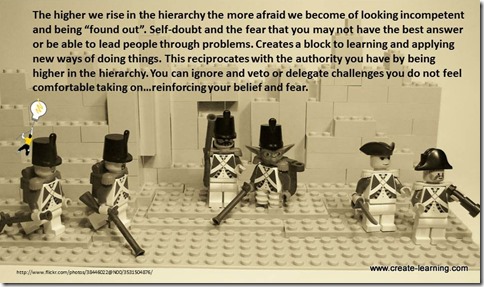It was day 1 of an 8 month Exponent Leadership-Development program with 12 people from different areas of the company. It started as usual and I was my smiling, nervous, insane, overly optimistic self…
Until the following week
Phone rings, “Mike this is Kathy several of our managers have concerns about the first field assignment and we need to meet”. Me, “OK can you let me know what the concerns are?” Kathy “Well they are saying that they did not know it would be this much of a commitment”, Me “Hmm… we covered all that in the 1st workshop…OK let’s set up a meeting.”
This is when I understood ‘psychological inertia’ – comfort and stuckness in thinking AND what Schein meant in Stage 1 of change Becoming Motivated to Change when people show denial; scapegoating; maneuvering and bargaining.
The same group of managers who were enthusiastic about management development and applied leadership to the organization, turned from cooperators to resistors in 3 days!
An area of change we fear
Fear of temporary incompetence
- During the transition process, you do not feel competent because you have given up the old way and have not yet mastered the new one. Edgar Schein
The higher we rise in the hierarchy the more afraid we become of looking incompetent and being “found out”. Self-doubt and the fear that you may not have the best answer or be able to lead people through problems. Creates a block to learning and applying new ways of doing things. This reciprocates with the authority you have by being higher in the hierarchy. You can ignore and choose to veto or delegate challenges you do not feel comfortable taking on…reinforcing your belief and fear.
If you are asked to learn a new skill, for example work to improve your skills at management, the fear that your peers may see you as temporarily incompetent causes you to reject the change outright. After all you are a manager and have been promoted, so you must already know what you are doing, right?
Change within work has the capacity to attract trust and repel trust based upon the clarity and reinforcement given during the change.
How to work with this?
Following my own advice of seeing resistance as a gift and a chance to determine how to cooperate, here are some lessons learned.
- It is NOT helpful to fight and argue
- It is helpful to listen, agree and cooperate. Talk to discover slightly different viewpoints for cooperation
- Make failure and learning part of the objectives
- Instead of making them more anxious. Make the learning easier
- Use how each person and the team responds as a chance to make the learning even easier
- Once the team and I found what works we kept doing more of that
As we followed a similar path above over the 8 months…the fear of temporary incompetence became excitement of mastering new management and team tools and processes. We had a few set-backs and the fear of temporary incompetence returned in different ways.
Following the steps and ideas above PLUS consistently communicating and working with the team and the people on the team we become collaborators to make change happen.
What do you think?
What resistance to change do you experience? What works to limit some of this resistance? What steps would you add?



